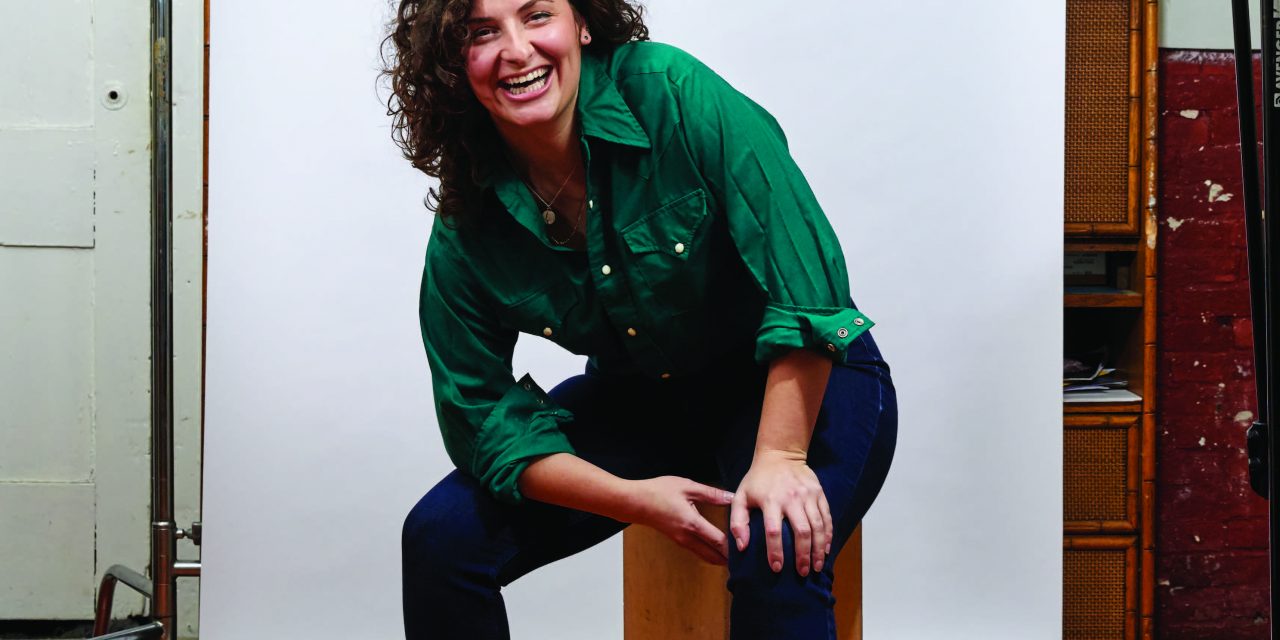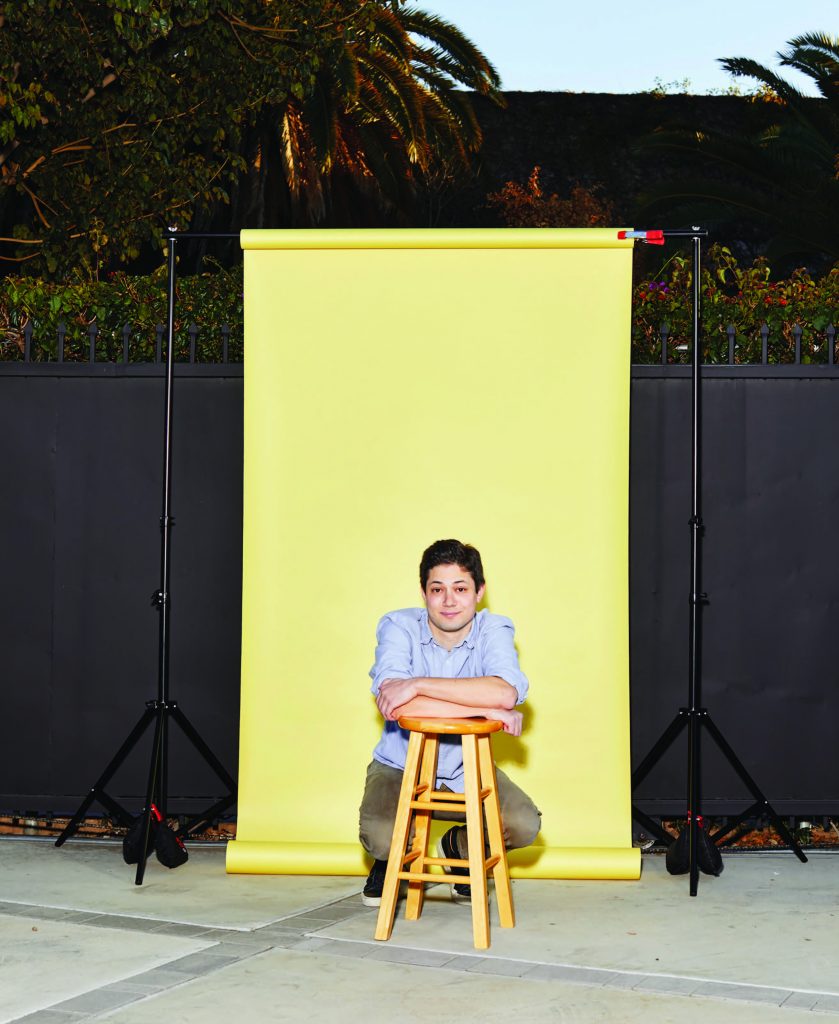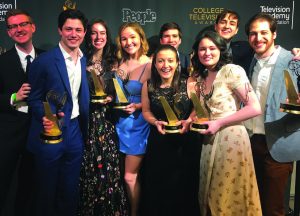
COMEDY: KEEP ’EM LAUGHING

What does it mean, in a fractured time like this, to be funny? What—in the midst of public health, political, social, and environmental crises—does a sense of humor look like?
Comedians have always served society by highlighting the absurd and the ironic, even the darkly morbid opportunities to laugh. Satire, play, jokes, mimicry, and mockery mark thousands of years of art and storytelling around the world. Although humor doesn’t always translate across cultures, funny people—from jesters to playwrights to stand-up comedians to TikTok stars—have played important roles in diverse world traditions. They speak
truth to power, call out hypocrisy, inform the public, and, just as important, invite us into pure, giddy silliness.
This past fall, as the covid-19 pandemic entered its darkest days and political chaos reigned, Milton Magazine reached out to two alumni in comedy, GEMMA SOLDATI ’09 and MAX KLIMAN ’15, for a serious look at the unserious.
“It’s not like comedians are bringing funny into society,” says Soldati, a creator and theater performer. “People who are comedians in any form are simply the ones who are saying, ‘Look, everybody, look.’ Comedy exists in the same way that gravity exists. It’s just there. You either see it or you don’t, but it’s still going to be there. We all trip. We all stub our toes and bump our heads. Humans are funny. Life is funny. Having a sense of humor is just about being available to that reality.”
Milton has graduated its fair share of funny people, including actor and comedian JENNY SLATE ’00; playwright DAVID LINDSAY-ABAIRE ’88; WILL GRAHAM ’98, executive producer for Mozart in the Jungle and various projects for The Onion; DJ NASH ’90, who toured as a standup comic before developing several sitcoms and the ABC drama A Million Little Things; and CJ HUNT ’03, a field producer for The Daily Show. Milton students participate in improvisational comedy classes and performances, and aspiring humorists fill the back pages of The Milton Paper and The Milton Measure with jokes.
Answers to the question “What’s funny?” have varied over the years and continue to be highly subjective. Many comedians emerging today are politically and socially aware, smart, and exploring new media. As some decry what they view as censorship for the sake of political correctness in humor (“cancel culture,” in other words), others, like Soldati and Kliman, celebrate an industry that’s gradually making way for more diverse voices and viewpoints.
—
Soldati and her writing partner, Amrita Dhaliwal, developed their award-winning 2018 clown show, The Living Room, while they were both coping with devastating loss— the deaths of Soldati’s boyfriend and Dhaliwal’s mother. The show, billed as “a comedy of grief,” featured the two creators as accountants of the death toll, mixing comedy and tragedy. It became a festival hit, winning Best Comedy at the Melbourne Fringe Festival in 2019.

SOLDATI BEGAN LAST
SUMMER TO DEVELOP THE
PLAY AROUND SLEEPYHEAD,
A CHARACTER SHE
CREATED YEARS AGO.
Clown, in the context of Soldati’s work, is a specific type of theater performance that involves playfulness and interactivity. Audiences watching The Living Room or her new show, The Adventures of Sleepyhead, might not jump to the word “clown” to describe the shows, she says. They might describe them funny plays with improvisation. Her style is derived from the Italian commedia dell’arte tradition. She connects directly with the audience, employing physical comedy and breaking the fourth wall to engage with the crowd.
When the pandemic came to the United States and performance venues across the country shut down, Soldati’s plan to tour with The Living Room fell apart. She had just moved back to her home state of New Hampshire after eight years in Los Angeles. Eventually she began developing The Adventures of Sleepyhead, a family-friendly solo show, for a local theater, where she had the option to live-stream her performance. A limited live audience of people who had quarantined together provided the interactive experience.
“Working on it has been a lifesaver,” Soldati says. “There is a real loss that has taken place for artists of all kinds. I felt at one point like all hope was lost and I would never do anything creative again.”
Last summer, before she even got her contract with the theater, Soldati began to develop the play around Sleepyhead, a character she created years ago. She started by making Sleepyhead’s costume, which she worked on “incessantly” as a distraction from the sadness of the pandemic.
—
 Kliman, an award-winning sketch comedy writer and producer, also felt the loss of live performance. He works for a management and production company in Los Angeles and runs a sketch comedy group called Scary Horse with his Milton friend and current roommate, JAKE DANIELS ’15. Although live shows were temporarily on hold because of the pandemic, the group continued its work on Zoom or recorded sketches in small, quarantined pods.
Kliman, an award-winning sketch comedy writer and producer, also felt the loss of live performance. He works for a management and production company in Los Angeles and runs a sketch comedy group called Scary Horse with his Milton friend and current roommate, JAKE DANIELS ’15. Although live shows were temporarily on hold because of the pandemic, the group continued its work on Zoom or recorded sketches in small, quarantined pods.
“Everything kind of went off the rails for a bit, but we soon realized that we could make our work happen,” Kilman says. “It’s been exciting to still be able to make things and to work in a new way that comedy hasn’t really seen before. We’ve been trying to follow the model of Saturday Night Live when they did their SNL From Home shows and figuring out the best way to make funny content even when people can’t really be around each other.”
For audiences, laughter and the state of play inherent in comedic performance provide an important service in times of grief or anxiety. Watching comedy can momentarily take the power out of something frightening or tragic, Kliman and Soldati say, or simply help relax people, regardless of what they’re going through.
“On a very superficial, surface level, comedy can be a salve to help heal an open wound,” Soldati says. “Or you can think of it from the chemical standpoint of laughter: It releases endorphins. It literally provides us with the chemicals we need to feel good.
“But then, philosophically, what it does is allows us, especially in a trying time like the pandemic or dealing with death, to see the wider picture of human experience. Comedy helps us realize, ‘Oh, sure, we’re in this absolute hellhole right now, but there are still so many things going on that are hilarious.’”
A dry, biting humor permeates modern comedy, Kliman says, particularly among young creators, in response to absurd and difficult circumstances. Even the most painful topics are fair game.
“People are commenting on what they’re observing and doing so in funny ways,” he says. “It’s a good way of coping with the world. In a lot of ways, it’s just reacting to reality, but it’s so raw and so funny just to call things out for what they are. On a lot of platforms, but TikTok in particular, people create videos in response to someone else’s actions, which has become a new form of social commentary.”
—
At one point in the past decade, Jon Stewart ranked among the most trusted media figures in the United States, particularly among young people. Stewart, a comedian and actor, was the host of The Daily Show on Comedy Central until 2015. Today, comedians such as John Oliver, Samantha Bee, and Stewart’s successor, Trevor Noah, are seen by some audiences as credible (and funny) news analysts.
Comedians, as opposed to political and business leaders, aren’t restricted by any filter when they speak, Kliman says. The pressure to appear unbiased does not apply to late-night hosts and satirists the way it does to mainstream journalists. While attending Northwestern University, Kliman interned at The Late Show with Stephen Colbert. Colbert said that part of his role as a late-night host was to make sure to give context and a realistic reaction to the day’s most absurd news.

KLIMAN WAS A WINNER OF THE 39TH COLLEGE TELEVISION AWARDS, WHICH RECOGNIZE STUDENT-PRODUCED PROGRAMS FROM COLLEGES AND UNIVERSITIES NATIONWIDE.
“The fact that we have comedians who are really smart and informed, who can make jokes about the things we’re all observing, is a real positive,” Kliman says. “Something I learned from Colbert is that comedy can be an effective way to reassure people that they’re not crazy for thinking what’s going on in the world is crazy.”
In college, Kliman joined The Blackout, a late-night show at Northwestern, and led the creation of the web segment “Quarter Update,” a news parody styled after Saturday Night Live’s “Weekend Update.” The segment, which covered Northwestern-related news, won a College Television Award— the Emmys equivalent for college TV. His work as a student opened up opportunities to intern at several late-night TV shows.
At The Late Show, Kliman witnessed the rush of building a nightly talk show, where the content had to reflect the day’s news and provide unique takes on a variety of subjects. “You’d walk in at 9 a.m., he says, “and there’d be nothing ready, but by the afternoon you’d have a show to shoot, and in the evening, it would be all edited and ready to go. It was the most exciting and impressive experience.”
Breaking news in 2020 flew so quickly that major stories, like the discovery of water molecules on the moon, lasted barely a day in headlines. Comedians, despite performance restrictions due to covid-19, kept a running commentary on the flood of events—or provided light and funny distractions—through TV shows with adjusted formats, Twitter, TikTok, Zoom appearances, and outdoor venues that allowed for physical distancing.
Audiences respond well when a comedian can take a complex subject and deconstruct it or offer a unique viewpoint that people aren’t seeing elsewhere, Soldati says.
“I think comedy can be a really beautiful messenger to help people get from point A to point B, particularly with difficult issues,” she says.
—
“Do you understand what self deprecation means when it comes from somebody who already exists in the margins?” Hannah Gadsby says in her 2018 special, Nanette. “It’s not humility, it’s humiliation. I put myself down in order to speak, in order to seek permission to speak, and I simply will not do that anymore, not to myself or anybody who identifies with me.”
Gadsby made headlines for Nanette, during which she talks about surviving sexist and homophobic violence and announces that she’s finished making jokes at the expense of her identity and well-being. The show starts as a traditional standup special before shifting into serious, sometimes uncomfortable commentary about the harmful effects of comedy on marginalized people. Nanette was hailed by some as a subversive and revolutionary piece of art reflecting the #MeToo era and dismissed by others who complained that its success was part of a damaging trend of politically correct “wokeness” that threaten to destroy comedy.
Political correctness, argues comic actor John Cleese, stifles creativity and indulges the “most over-sensitive” people in a society.
Good comedians, regardless of medium, are those who recognize the importance of playfulness and strong emotions and use them to their advantage, Soldati says. Once a state of play is established, not even the most sensitive topic is off-limits, provided the comedian is skilled and creative enough to handle it.
“Everything is on the table with play,” she says. “Scientists have studied the physiological reality of being in play, and we know that it puts us in a heightened state. You can bring an audience anywhere with you if you have the chops and can be playful.”
Kliman rejects the idea that political correctness is censoring or watering down comedy. Audiences change over time, he says, and what was considered funny in the past may no longer cut it. Comedians need to adapt for today. Comedy used to take place in limited venues— making it difficult for newcomers to be heard in an industry long dominated by a select few white men. Because there are so many more avenues for funny people to create and perform, the world of comedy is more open to diverse voices and viewpoints than it was in the past.
“I think that, for the most part, the people who are upset at wokeness in comedy might just not be good enough,” Kliman says. “While in the past, comics could be lazy and say racist or sexist things to get a laugh, they have to be smarter now, because audiences won’t respond to that. You can still joke about things that are controversial and hard to discuss, but you have to have an interesting angle on them. It’s not that people are too sensitive about comedy, it’s just that outdated ideas don’t work.”
STORY BY MARISA DONELAN
Gemma’s photograph by Jonathan Kozowyk
Max’s photograph by Maggie Shannon




